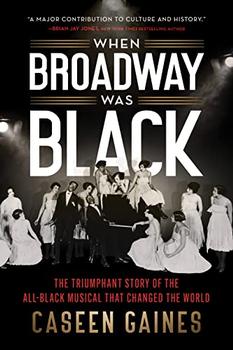Summary | Excerpt | Reading Guide | Reviews | Beyond the Book | Readalikes | Genres & Themes | Author Bio
The Triumphant Story of the All-Black Musical that Changed the World (aka Footnotes)

Critics' Opinion:
Readers' Opinion:
First Published:
May 2021, 352 pages
Paperback:
Feb 2023, 352 pages
 Book Reviewed by:
Book Reviewed by:
BookBrowse First Impression Reviewers
Buy This Book
THE CROWD-PLEASER
1921
Opening night was going better than any of them could have expected, but the performers knew the rapturous applause was obscuring the truth; there was a good chance someone was going to get killed at any moment, and it was likely to be one of them. From backstage, they could hear that the controversial scene was upon them, and they hadn't forgotten the warning they had received about how the well-dressed white people in the audience might react when they saw it. While the men bore responsibility for what was about to go down, they weren't going to bear witness nor fall victim to it. Noble Sissle, who had been dubbed the greatest vocalist of his race, gathered Flournoy Miller and Aubrey Lyles, whose comically emotive brown faces were hidden beneath a layer of burnt cork. It was time for the three of them to quietly put their plan into motion. From the wings, they could see their leading players, Lottie Gee and Roger Matthews, taking center stage, which was the cue for Sissle, Miller, and Lyles to proceed to the side exit. They pushed the double doors open wide, and each placed a foot on the New York pavement, pointed toward the safe haven of Harlem. The white rioters wouldn't be able to find them here. If things suddenly turned violent, at least they had secured an escape route. Everybody else was on their own.
"Harry, you can't lose," Jessie Williams said as she crossed over to her should-be betrothed. "Jenkins or Peck beating you, why the idea is absurd."
"I know, Jessie," Harry Walton responded, his voice sullen. "But suppose—"
Before Harry could finish his thought, Eubie Blake, the conductor, dressed as if he were on his way to the opera, started the orchestra. Gee sang longingly to her partner, he reciprocated in kind, and as the ballad hit its climax, the two locked eyes and harmonized: "Love will find a way, / though skies now are gray. / Love like ours can never be ruled. / Cupid's not schooled that way."
The men at the door kept quiet, hoping the noise from the automobiles and passersby on the Manhattan street wouldn't obscure the sound of the audience turning. They needed any head start they could get.
In the orchestra pit, Blake was unaware of what his business partners were up to. The sweeping number was one of his favorites—he was best known for ragtime and jazz, but he had longed to compose a song in the style of Leslie Stuart ever since he was a little boy—and as he directed his musicians, who were shoehorned into where the first three rows of audience seating should have been, a clear reminder that the venue was never intended to hold a musical comedy of this size, he couldn't help but sway along with the melody. Lottie Gee's lithe soprano voice was blending perfectly with Roger Matthews's affectionate tenor, but their synergy did little to assuage the feeling Sissle, Miller, and Lyles had that things were just moments away from hitting the fan.
It wasn't that white folks had a problem with seeing Black women onstage. They were comfortable with mammies—good- natured, asexual homemakers who freely doled out folksy wisdom and kept the children in line. They could laugh at sapphires—domineering women who emasculated their men and drove them away from the home. They were familiar with jezebels—sexually hungry vixens who couldn't help but satisfy their primal desires with every man they came into contact with; white men, in particular, were defenseless against their feminine wiles. And their hearts bled for tragic mulattas—light-skinned beauties who might have a chance if the Lord had blessed them with the ability to hide or possibly even if they were smart enough to reject their Blackness.
Any of these were more than welcome, but a Jessie Williams, a Black woman who expressed love for a Black man, was something different altogether. And not just love but a sincere and unfunny love, emotionally articulated in song, just like they did in Ziegfeld's Follies in Midtown. Even in liberal New York, the cloud of Jim Crow still hung overhead, and there were legitimate fears among many in the production that the exuberance felt in the audience during the previous song, the freewheeling and jubilant dance number with caramel-colored chorines eccentrically shimmying about, would dissipate as soon as they caught wind of where the musical was headed. There was a legitimate chance that the musical comedy could give way to an all-out race war that would almost certainly spill out onto Sixty-Third Street.
Excerpted from When Broadway Was Black by Caseen Gaines. Copyright © 2021 by Caseen Gaines. Excerpted by permission of Sourcebooks. All rights reserved. No part of this excerpt may be reproduced or reprinted without permission in writing from the publisher.
When first published in hardcover in 2021, this book was titled Footnotes: The Black Artists Who Rewrote the Rules of the Great White Way. In paperback, it was renamed, When Broadway Was Black: The Triumphant Story of the All-Black Musical that Changed the World. The reviews below were written ahead of the hardcover edition being published, and thus refer to Footnotes.





The Funeral Cryer by Wenyan Lu
Debut novelist Wenyan Lu brings us this witty yet profound story about one woman's midlife reawakening in contemporary rural China.
Your guide toexceptional books
BookBrowse seeks out and recommends the best in contemporary fiction and nonfiction—books that not only engage and entertain but also deepen our understanding of ourselves and the world around us.